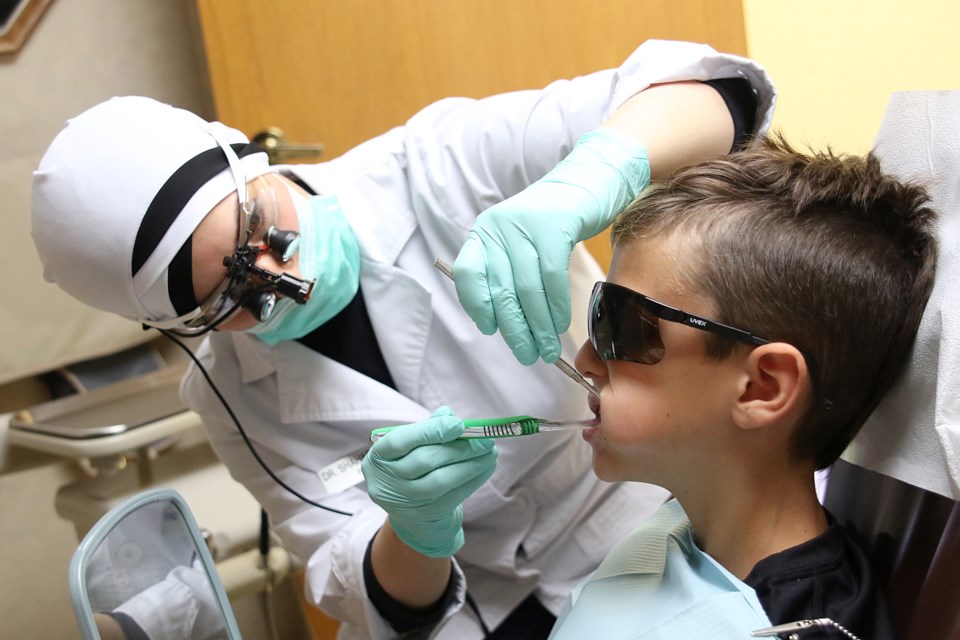THUNDER BAY — The new Canada Dental Benefit will help children from lower-income households access care, but local dental clinics say it’s just a small step in tackling the unmet oral health needs of thousands of Thunder Bay residents who struggle to pay for trips to the dentist.
The program, introduced in November by the federal government, will offer up payments of between $260 and $650 per child over the next two years to support care for children under 12 who aren’t covered by private dental plans.
Families earning less than $90,000 per year are eligible, with amounts adjusted based on net income. Applications for the program began last week, and more information about the benefit and how to apply is available at the government’s website.
Carolyn Tait, the manager of oral health programs for the Thunder Bay District Health Unit, cautioned those amounts won’t go too far, but will cover some basic care or defray more costly interventions like braces.
“We see this as a positive move, people having any funds to pursue care," she said. “It isn’t a significant amount of funds if the child has significant oral health issues, but it is something.”
“It would be nice to see the program develop further and see where it goes.”
The new benefit comes at a moment when help is particularly needed, Tait said.
“We are finding children have more urgent needs at this point in time due to COVID and lack of access to dental providers,” she reported.
The health unit screens thousands of local kids through school visits, and offers preventive services like scaling and fluoride to kids 17 and under via its own dental clinic.
The agency also helps administer the Ontario Seniors Dental Care Program, which currently assists about 450 local seniors, and Healthy Smiles Ontario, which provides no-cost basic dental services to low-income families.
The Healthy Smiles program offers crucial support, but many low-to-middle income earners can’t access it and still struggle with dental bills, Tait said. A family with two children must have a net household income of $26,817 or lower to qualify.
“So the Canada Dental Benefit will potentially help those families who potentially have a lower income, but do not have dental plans and cannot afford to prioritize oral health care needs,” she said.
Oral health has implications for kids when it comes to learning, nutrition, and socializing, Tait said, while the health unit notes poor oral health has been linked to conditions like diabetes and heart disease.
The Canada Dental Benefit is expected to support care for 500,000 children and cost close to $1 billion, the government has estimated.
The program is one of the fruits of the Liberal-NDP confidence-and-supply agreement that’s propping up the Trudeau minority government. That deal included a commitment to expand the dental program to include those under 18 by next year, and all Canadians who qualify by the end of 2025.
Tait welcomes that expansion, saying many seniors and low-income adults are putting off dental work, causing larger health consequences down the line.
“We’ve found many [seniors] have very high needs and haven’t been to a dental provider in many, many years and have significant issues,” she said. “Many have been living with painful conditions.”
“We also know there’s a gap for adults. There’s not a lot of publicly funded programs available for adults … even in situations where they have urgent needs. Many people arrive at Emergency.”
One program helping people without coverage avoid that outcome is the dental clinic at Confederation College, where several dozen dental hygiene students offer services including assessments, polishing, radiographs, and fluoride for nominal fees of $20 to $30 per visit.
There’s a serious need for access to dental care in the community, with the clinic seeing about 120 people a week, including seniors and children, and sometimes booked months in advance, said clinic manager Alison MacMillan.
“We have approximately 16 new clients call each day that would like access to the care we offer,” she said. “We do our best to see everyone, but there is a very high demand for people to access this service.”
MacMillan said the impacts for those who struggle to access care are wide-ranging.
“It affects their overall health, obviously, if they’re suffering with any kind of dental decay, gingivitis,” she said, adding people also contend with “the stress level when you can’t afford dental care and have nowhere to go.”
